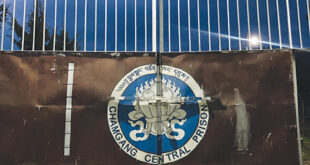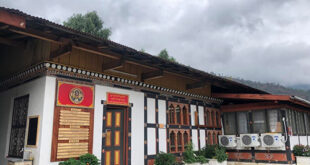The Cabinet in a meeting held towards the end of June 2015 asked the Ministry of Finance and the Ministry of Economic Affairs to study the possible handover of Business Opportunity and Information Center (BOiC) operations to the Bhutan Development Bank Limited (BDBL).
This could mean the effective dissolution of the BOiC as an autonomous organization handling Nu 1.9 bn worth of Economic Stimulus Program (ESP) funds.
Though the study is in its early stages and both ministries will give joint recommendations there is already a strong feeling within the cabinet to settle for this option.
The Cabinet decision was motivated mainly by the National Council’s resolution on 29th May 2015 to submit the issue of the legality of BOiC to His Majesty the King. His Majesty the King may choose to ask the Supreme Court for an interpretation.
Lyonchhen Tshering Tobgay said, “We are looking at the whole matter very carefully given what has transpired during the last session of the National Council.”
The Minister for Economic Affairs Lyonpo Norbu Wangchuk said, “We still believe that BOiC is completely legal but given the objection by various institutions like the NC, Opposition, etc the cabinet decided to look into handing over BOiC’s operations to the BDBL.”
“We explored many options but we are zooming into this one as it is a harmonious and convenient one,” said Lyonpo.
He said that ideally the best option is to keep BOiC as it is but given the circumstances the next best option is to handover the BOiC operations to BDBL.
Lyonpo pointed out the current controversies around BOiC was creating a lot of distraction to BOiC operations and creating apprehensions for those applying to BOiC for loans and those who have obtained loans.
“It is important to address the situation so that BOiC can operate and fulfill its mandate and so that both the people availing the loans and the staff at BOiC are comforted,” said Lyonpo.
However, Lyonpo pointed out that it will be important for BDBL to maintain the same interest rates, loan ceilings and mortgage free conditions so as to not affect the scheme. He said this would be one area which the joint task force would look at.
On the fate of the BOiC employees the minister said that given the huge and complex nature of the fund and especially with the risk management required the BDBL would require a team of qualified and experienced people.
He said ultimately it would also depend on the recommendations of the joint task force on the issue.
The fate of the current BOiC MD is uncertain given that the current BDBL MD draws around half the pay of the BOiC MD and the fact that one organization cannot have two MDs. Here the minister said that the fate of the BOiC MD would depend on the recommendations.
A senior government official on the condition of anonymity said that BDBL was chosen for the study because the BDBL under an agreement with BOiC is already performing many banking functions for the BOiC.
The BOiC currently does the loan appraisal, project appraisal and finally approves the loan but the BDBL sanctions the loans after the necessary legal requirements and then follows up on interest payments including checking on the projects.
Under this arrangement BDBL is paid around one percent per annum of the outstanding loans. However, there would be deduction made by if the Non Performing Loans are high.
BOiC had chosen BDBL for this service given that BDBL has maximum rural outreach with 32 branch offices in 20 Dzongkhags.
BDBL also has a range of loan products with varying interest rates including its own staff loan which has a 5 percent interest rate.
Currently BOiC has 22 staff including the MD and three support staff. Its operating expense in 2014 was Nu 15.35 mn of which around Nu 9.36 mn is in salaries. As of 30th June 2015 there was a total of 4,181 applicants of which 1,309 were approved, 1,852 were pending approval, 1,020 applications were closed and 70 were approved but withdrawn. Of the Nu 1.9 bn it handles Nu 400 mn is for rural areas while Nu 1.5 bn is for cottage and small industries.
Based on the applications approved the BOiC has estimated that it has created around 2,025 jobs so far.
Of the 4,181 applicants 2,093 were in the agricultural sector, 1,669 were in the livestock sector, 378 were in manufacturing and 41 were in other areas and services.
The BDBL as per its 2014 report has 385 staff with Nu 131.61 mn in wages and Nu 19 mn in training expenses. This expected to shoot up significantly with the BDBL taking over Community Centers and also establishing a Gewog Bank in each Gewog.
The BOiC was a part of the current government’s election promise of a Nu 5 bn Economic Stimulus Plan. On 4th December 2013 the cabinet gave the formal approval for the creation of the BOiC as a time bound autonomous agency for implementation of the Revolving Fund created as a part of Economic Stimulus Program.
The BOiC formally started its operations from 27th August 2014 but it ran into controversy even before it started operations.
From 2014 itself both the National Council and the Opposition challenged the legality of the BOiC. It also alleged that the disbursal of the fund was slow and it took a lot of red tape. There were also questions on the salaries of the BOiC officials.
MPs from both NA and NC including ministers, whenever on tour or while even in Thimphu were bombarded by calls and requests from their constituents to help them with getting BOiC loans. To add to this the local governments of many gewog and Dzongkhags were also under constant pressure from villagers to make it easier to get BOiC loans. There were also allegations made by some that BOiC would benefit party supporters of PDP.
The BOiC on its part pointed out various attempts made by ordinary people to misuse the fund and said the necessary checks were necessary especially for a fund without any collateral. It gave may instances of attempted fraud by loan applicants. It also denied any attempts to favor supporters of one party and said it was open to scrutiny on the party affiliations or the lack of it of those who did get the loans.
The government also defended BOiC both in the NA and the NC. The NC in May 2014 asked the government to draft a BOiC Act to give it a legal status. The government was also asked to get an answer on the legal status of BOiC from the Office of the Attorney General.
The PM on May 2014 in the NC said that BOIC was legal and gave the example of the creation of other bodies like the Royal Education Council, Royal University of Bhutan and the Agency for Promotion of Indigenous Crafts under the former government.
The NC waited for around a year for action on the issue and finally on 29th May 2015 put the issue to His Majesty the King.
Lyonchhen said that in the previous session of the NC (30th May 2014) he had explained the legal status of BOIC and even categorically offered to close it down if it was proven to be illegal.
The PM said he had asked the NC for specific clauses on why it was illegal and that he would be happy to address their issues, but the NC was yet to tell him why it illegal and instead put up the appeal.
 The Bhutanese Leading the way.
The Bhutanese Leading the way.



